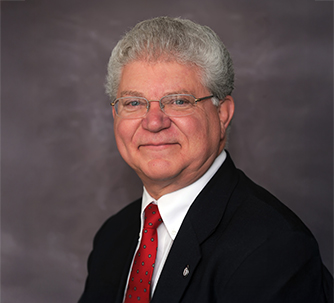Professor, Chair of the Department of Biomedical Sciences & Vice Dean for Basic Sciences, Marshall University Joan C. Edwards School of Medicine

By Dawn Nolan
As an original faculty member and now the chair of the Department of Biomedical Sciences and vice dean for Basic Sciences at the Marshall University Joan C. Edwards School of Medicine, Gary Rankin has had the special privilege of teaching pharmacology and toxicology to every class of medical students in the school’s history.
Rankin joined the Marshall University School of Medicine (MUSOM) as an assistant professor in 1978. During his first year, he helped develop a pharmacology syllabus—a subject the school wasn’t teaching at the time—and made an effort to obtain funding. He received his first grant for the project in 1979 and was able to build it into asuccessful program.
At the request of his mentor, Dr. Donald Robinson, Rankin served as interim chair for MUSOM’s Department of Pharmacology from 1984-1986. He officially became chair of the department and remained so until 2005. Rankin then served as chair of the newly merged Department of Pharmacology, Physiology and Toxicology from 2005-2016. Finally, when the dean combined all of the basic sciences in the medical school, Rankin was asked to chair the resulting Department of Biomedical Sciences and become vice dean for Basic Sciences.
“Many of the physicians I have helped train and mentor have risen to high levels of leadership in the West Virginia health care system,” Rankin says. “I am proud of them and feel honored to have been a part of their path to success.”
A native of Arkansas, Rankin originally wanted to be an astronaut and study aerospace engineering. However, the lingering effects from a serious leg injury and his growing disinterest in engineering led him to instead pursue a degree in chemistry. He was then inspired by a close friend with grand mal epilepsy to use his expertise to help create a better drug to treat the condition. This led Rankin first to the graduate program in medical chemistry at the University of Mississippi, then to a postdoctoral training program in pharmacology at the Medical College of Ohio.
“At this point, I decided my career in research would be to investigate how drugs, agricultural agents and industrial compounds induced toxicity to the kidney,” he says.
Rankin credits his father for encouraging him to further his education despite the family’s low income and his own eighth grade education.
“He indicated that he couldn’t afford to pay for my college education but that he would help me find a job to pay for my schooling and give me a tank of gas a week for my car,” Rankin says. “He also taught me to respect others, be fair and help those who needed help. Those have been values that have helped me through all phases of my career and life.”
Rankin has received a number of professional accolades throughout his career, including the Joseph Sam Distinguished Alumnus Award from the Department of Medicinal Chemistry at University of Mississippi; Researcher of the Year Award from the West Virginia affiliate of the American Heart Association; 2019 American Society for Pharmacology and Experimental Therapeutics Division of Toxicology Career Award; the first Meet the Scholar Award and the Faculty Salute Award from Marshall and several professor of the year distinctions. He has also received Excellence in Teaching, Excellence in Leadership and Excellence in Mentoring distinctions from the Marshall University Joan C. Edwards School of Medicine. Rankin was also selected as an honorary alumnus in 2018.
“While many of these honors are very special to me, being selected as an honorary alumnus of our medical school means the most,” he says.
From undergraduate students to postdoctoral fellows and junior faculty, Rankin has been a mentor for individuals at all levels of their education and careers.
“I have been very fortunate throughout my career and feel that helping others grow and develop their careers is important and helps develop the next generations of scientists, physicians and teachers,” he says.
Outside of his work, Rankin is dedicated to serving his community through the Huntington Museum of Art by sitting on different committees. He is an avid birder and has been a member and officer of several local bird clubs, has helped develop several bluebird trails in the Huntington area and often talks to groups about bird feeding, migration and his personal adventures in the field.
After experiencing the beauty of West Virginia during a graduate school trip, Rankin felt he could live in the Mountain State one day. When he received the offer of a faculty position at Marshall years later, Rankin says he felt like he had come home.
“I have always found the people of West Virginia to be some of the best,” Rankin says.
West Virginia IDeA Network of Biomedical Research Excellence
Part of the National Institutes of Health (NIH) Institutional Development Award (IDeA) Program, the West Virginia IDeA Network of Biomedical Research Excellence (WV-INBRE) is a statewide project designed to build a consortium to enhance biomedical research training opportunities at undergraduate institutions. The WV-INBRE is an extension of the West Virginia Biomedical Research Infrastructure Network (WV-BRIN) and was established in 2004 after Marshall University, in partnership with West Virginia University, received a three-year NIH BRIN planning grant in 2001. Rankin is the principal investigator for the project, which has now completed its fourth phase and been renewed for another five years. Addiction is the latest area of research.
“WV-INBRE has helped so many college and university faculty members around the state develop their research careers by providing funding for their biomedical research projects and much needed infrastructure for their institution,” Rankin says. “The summer research program and research projects funded at the undergraduate institutions in West Virginia have also provided research training experiences to more than 1,500 West Virginia college students. “Collectively, the WV-INBRE program has brought more than $90 million to our state with an economic impact of almost $200 million.”








